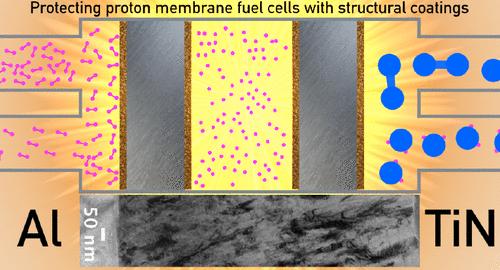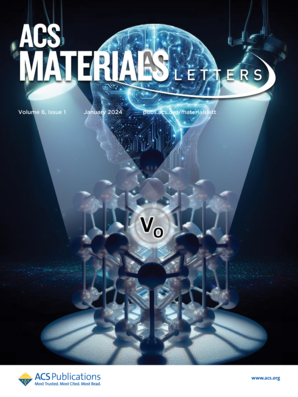用于铝基质子交换膜燃料电池腐蚀防护的高性能氮化钛结构涂层
IF 8.7
1区 化学
Q1 MATERIALS SCIENCE, MULTIDISCIPLINARY
引用次数: 0
摘要
汽车电气化是减少温室气体排放、满足新能源政策要求的关键。质子交换膜燃料电池(PEMFCs)等新能源已成为最具可持续性的解决方案之一。其性能取决于材料的选择,如双极板(BPP)。要实现 PEMFC 的商业化和普及,减少重量、体积和成本至关重要。在这种情况下,尽管铝的耐腐蚀性不足以适应 PEMFCs 的恶劣环境,但它仍是 BPPs 的理想候选材料。最近,氮化钛(TiN)涂层显示出提高铝 BPPs 耐腐蚀性的潜力。在这里,我们发现铝-氮化钛功能体系在模拟 PEMFC 环境中的性能可以通过合成参数来调整。结合透射电子显微镜进行的电化学测试表明,最佳沉积设置可通过形成更致密、无缺陷的薄膜微结构来显著提高耐腐蚀性。本文章由计算机程序翻译,如有差异,请以英文原文为准。

High-Performance Titanium Nitride Structural Coatings for Corrosion Protection of Aluminum-Based Proton Exchange Membrane Fuel Cells
Electrification of vehicles is the key to reduce greenhouse gas emissions to meet new energy policies. New energy sources such as proton exchange membrane fuel cells (PEMFCs) have arisen as one of the most sustainable solutions. Their performance depends on the choice of materials, such as bipolar plates (BPPs). Reduction in weight, volume, and costs are of paramount importance to enable commercialization and popularization of PEMFCs. In this context, aluminum emerges as a promising candidate for BPPs, although its corrosion resistance is inadequate for the harsh environment of PEMFCs. Recently, titanium nitride (TiN) coatings have shown potential to increase the corrosion resistance of aluminum BPPs. Herein, we discovered that the performance of the aluminum-TiN functional system in a simulated PEMFC environment can be tailored by synthesis parameters. Electrochemical tests in combination with transmission electron microscopy indicate that optimal deposition settings can significantly improve the corrosion resistance by creating denser and defect-free film microstructures.
求助全文
通过发布文献求助,成功后即可免费获取论文全文。
去求助
来源期刊

ACS Materials Letters
MATERIALS SCIENCE, MULTIDISCIPLINARY-
CiteScore
14.60
自引率
3.50%
发文量
261
期刊介绍:
ACS Materials Letters is a journal that publishes high-quality and urgent papers at the forefront of fundamental and applied research in the field of materials science. It aims to bridge the gap between materials and other disciplines such as chemistry, engineering, and biology. The journal encourages multidisciplinary and innovative research that addresses global challenges. Papers submitted to ACS Materials Letters should clearly demonstrate the need for rapid disclosure of key results. The journal is interested in various areas including the design, synthesis, characterization, and evaluation of emerging materials, understanding the relationships between structure, property, and performance, as well as developing materials for applications in energy, environment, biomedical, electronics, and catalysis. The journal has a 2-year impact factor of 11.4 and is dedicated to publishing transformative materials research with fast processing times. The editors and staff of ACS Materials Letters actively participate in major scientific conferences and engage closely with readers and authors. The journal also maintains an active presence on social media to provide authors with greater visibility.
 求助内容:
求助内容: 应助结果提醒方式:
应助结果提醒方式:


